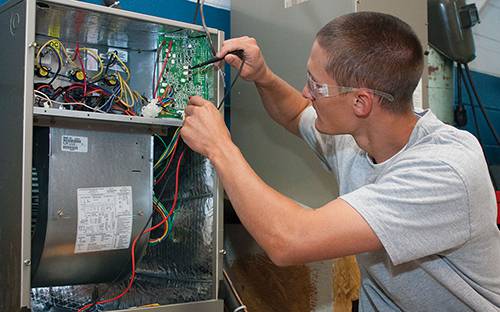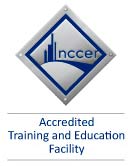
Contact the Pensacola State College Applied Technology and Professional Services Department for assistance in planning your program of study.
phone: (850)484-2544
email: admissions@pensacolastate.edu
ACCREDITED BY:
Pensacola State College is an approved NCCER Accredited Training and Education Facility under the sponsorship of The Southern Company. http://www.nccer.org/
RELATED DOCUMENTS
RELATED LINKS
SITE LINKS
SEARCH PROGRAMS
INTRODUCTION
This program prepares students for entry-level employment in the HVAC industry. HVAC is an acronym that stands for heating, ventilation, and air-conditioning. The HVAC industry is made up of skilled professionals, known as HVAC technicians, who install and maintain HVAC systems found in residences, commercial buildings, office buildings, schools, hospitals, and retail establishments. Air quality, temperature control, humidity regulation, refrigeration, heating, and other aspects of climate control are all handled by the HVAC systems.
Both theory and hands-on application of skills are emphasized in this program which enables students to obtain Level 1 thru Level 4 NCCER (National Center for Construction Education and Research) certification. The program also demonstrates elements such as planning, management, finance, technical and production skills, the underlying principles of technology, as well as, labor, health, safety, and environmental issues. Basic entry-level skills in math, reading, and language must be attained in order to complete this program.
Both full time (day) and part-time (night) programs are available. The full-time program is designed to take students one year to complete while the evening part-time program will take longer. Students wishing to enter this program of study should be advised by program personnel as to when introductory courses begin.
IS THIS FOR YOU
Persons entering this career enjoy working with tools and are good at working with their hands. They have good spacial and form perception and organizational skills.
BEYOND GRADUATION
After completion of post-secondary programs, new technicians often need at least six months of experience before being considered competent. Graduates may start in entry-level jobs assisting more experienced technicians. Some graduates will advance to supervisor or service manager. Others may move into sales or marketing. Still, others may become building superintendents, cost estimators, or possibly even teachers. Those with sufficient funds and managerial skill may op
RELATED CAREER OPPORTUNITIES
Primary Employers
Graduates from the Heating, Ventilation, and Air Conditioning program will be employed as HVAC mechanics, installers, and technicians. Building equipment contractors are the largest employers. HVAC technicians also may be self-employed.
Occupations
Heating, Ventilation, and Air Conditioning (HVAC)
Technicians Often specialize in either installation or maintenance and repair. They may also categorize specializations by heating, air-conditioning, or even refrigeration work. Some specialize in a particular brand or more specific types of systems such as heat pumps, solar and hydronic systems.
Installers
Following blueprints and specifications, installers put in oil, gas, electric,solid-fuel,multiple-fuel, or other heating and air conditioning systems. They install fuel and water supply lines, air ducts and vents, pumps, and other components. They connect electrical wiring and check for proper operation.
Refrigeration Mechanics
Install, service, and repair refrigerating systems and equipment. They follow blueprints, design specifications, and manufacturers’ instructions. These mechanics connect equipment to ductwork, refrigerant lines, and electrical power source. After making the connections, they charge the system, check for proper operation, and program control systems.

 PirateQ
PirateQ 
